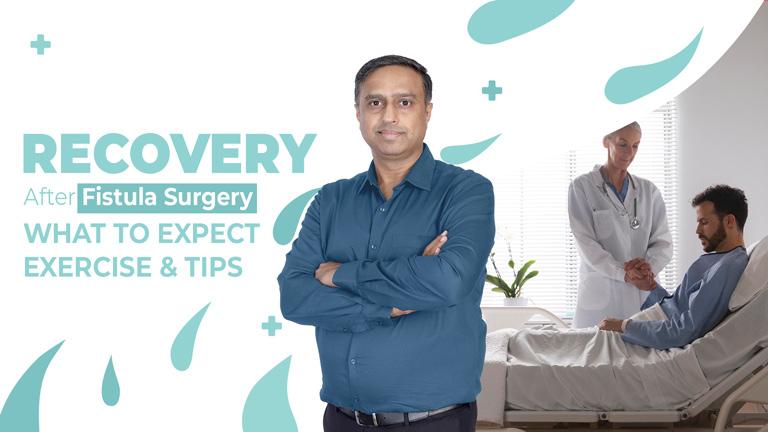What to Expect at home immediately after fistula surgery?
Pain and Discomfort: Some pain, swelling, and discomfort are common after surgery. Your doctor will likely prescribe pain medications to manage this. Pain should gradually decrease over time.
Dietary Changes: You may be advised to follow a specific diet to prevent constipation and promote healing. High-fiber foods, plenty of fluids, and balanced meals are usually recommended.
Hygiene: Proper hygiene is crucial to prevent infection. Keep the surgical area clean and follow your doctor’s instructions on cleaning the wound.
Physical Movement: While rest is important, gentle movement is encouraged. Gradually increase your activity levels as advised by your doctor, but avoid strenuous exercises or heavy lifting initially.
Wound Care: Follow your doctor’s instructions for wound care. Keep the surgical area clean and dry, and change dressings as needed.
Bowel Movements: You might experience changes in bowel movements due to surgery, pain medications, or dietary changes. Straining during bowel movements should be avoided.
Follow-up Appointments: Regular follow-up appointments with your doctor are important to monitor your healing progress and address any concerns.
How long will it take to recover from anal fistula surgery?
Recovery time after anal fistula surgery varies based on factors such as the surgical technique used, the complexity of the fistula, and individual healing rates. In general, initial healing may take a few weeks, during which pain, discomfort, and limitations in activities might be experienced. Complete recovery and return to normal activities can range from several weeks to a few months. Adhering to post-operative instructions, managing pain, following a proper diet, and practicing good hygiene are essential for a successful recovery. Regular follow-up appointments with the doctor help monitor progress and ensure optimal healing.
Tips and guidelines to follow after anal fistula surgery
Follow Instructions: Adhere strictly to your doctor’s post-operative instructions regarding medications, wound care, dietary restrictions, and activity levels.
Hydration and Diet: Stay well-hydrated and maintain a diet rich in fiber to prevent constipation and promote healing.
Pain Management: Take pain medications as prescribed and use over-the-counter options if approved by your doctor. Manage pain to minimize discomfort and promote movement.
Wound Care: Keep the surgical area clean and dry. If you notice signs of infection (redness, swelling, pus), contact your doctor.
Gentle Movements: Engage in gentle activities like short walks to improve circulation and promote healing, but avoid strenuous activities.
Hygiene: Maintain proper hygiene to prevent infection. Use mild, unscented soap and pat the area dry gently after cleaning.
Avoid Straining: Prevent straining during bowel movements by maintaining a high-fiber diet and using stool softeners if recommended by your doctor.
Sitz Baths: If advised by your doctor, take warm sitz baths to soothe the surgical area and promote healing.
Exercise to do at home for a healthy life post-fistula surgery
Engaging in gentle exercises at home after fistula surgery can promote overall health and aid in your recovery process. However, it’s important to consult your doctor before starting any exercise routine to ensure it’s appropriate for your individual condition. Here are some gentle exercises you can consider:
Walking: Start with short walks around your home and gradually increase the duration and distance. Walking improves circulation, helps prevent blood clots, and supports general well-being.
Deep Breathing: Practice deep breathing exercises to promote relaxation and reduce stress. Inhale deeply through your nose, allowing your belly to rise, and exhale slowly through your mouth.
Kegel Exercises: Kegels strengthen the pelvic floor muscles, aiding in bowel and bladder control. Squeeze the muscles you would use to stop the flow of urine and hold for a few seconds before releasing.
Leg Lifts: While lying on your back, gently lift one leg at a time, keeping your knee slightly bent. Alternate legs for a set of repetitions. This helps maintain leg strength and improve circulation.
Arm Circles: Stand or sit comfortably and extend your arms to the sides. Make small circular motions with your arms, gradually increasing the size of the circles. This exercise helps improve shoulder mobility.
Ankle Pumps: While sitting or lying down, move your ankles up and down in a pumping motion. This helps prevent blood clots and improves circulation in your lower extremities.
Gentle Stretching: Perform gentle stretches for your whole body, focusing on areas that may have become stiff due to decreased activity. Stretching helps maintain flexibility.
Yoga or Tai Chi: Consider practising gentle yoga or Tai Chi routines designed for beginners. These mind-body exercises improve flexibility, balance, and relaxation.
Wrap-up Tips:
Recovery after fistula surgery can vary based on factors such as the type of surgery, your overall health, and how well you follow post-operative instructions. Remember that recovery takes time, and every individual’s healing process is unique. Be patient with yourself and give your body the time it needs to heal properly. If you encounter any complications or have concerns, do not hesitate to reach out to one of the best fistula surgeons such as Dr. Sunil Tibrewal for guidance.






